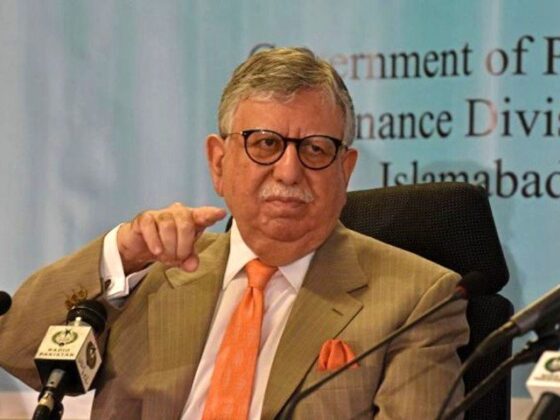ISLAMABAD: According to a finance ministry notification, the government has decided to set up the Economic Executive Council (EEC) to solve economic problems.
As per the notification, the nine-member council held its first meeting on Wednesday. The council, formed with Prime Minister’s Adviser on Finance Shaukat Tarin in the chair, included five ministers, two advisers, finance secretary and the State Bank of Pakistan (SBP) governor.
There are the Economic Advisery Council and the Economic Advisory Group that have representation of the private sector. The EEC seems to have little room for manoeuvring as the country’s economic policy is now defined under the International Monetary Fund (IMF) programme.
The EEC members are Finance Adviser Shaukat Tarin, Food Minister Fakhr Imam, Industries Minister Khusro Bakhtiar, Energy Minister Hammad Azhar, Planning Minister Asad Umar, Commerce Adviser Razak Dawood, Finance Secretary Hamid Yaqoob Sheikh and SBP Governor Dr Reza Baqir. All of them are already members of the ECC –the economic policy-making body of the federal cabinet.
“The Economic Executive Council (EEC) is constituted to review the overall economic condition of the country and take possible corrective measures considering available resources of the country”, reads the Finance Ministry’s notification.
“The main objective of the EEC is to initiate an integrated economic policy relevant for overall welfare of society,” it says, adding that the EEC will be engaged regularly on a weekly basis on the issues of national economic importance.
The notified scope of the council suggests that it would do the work, which is in the domain of the constitutional forums – the National Economic Council (NEC) and other Cabinet bodies like the Economic Coordination Committee (ECC), the Executive Committee of the National Economic Council (Ecnec), the Steering Committee on Foreign-Funded projects, the Monetary and Fiscal Policies Coordination Board, the Cabinet Committee on State-owned Enterprises and the National Price Monitoring Committee.
The EEC will analyse the effectiveness of the role of government in the provision of subsidies, protection and other financial support to the state-owned enterprises and important sectors of the economy in terms of economic gains and losses to the national exchequer – a function currently performed by the Cabinet Committee on SOEs.
The EEC will also ensure effective utilisation of the foreign assistance, according to the Finance Ministry. It will also monitor the mega initiatives of the government for jobs creation and higher growth.
The EEC is also expected to suggest policy initiatives that can bolster existing policies in order to enhance their economic, financial and fiscal impact. It will advise on the execution of mega infrastructure projects of energy, industries and production.
“The purpose of setting up the executive council is to have a supreme body of economic ministers to coordinate on strategic policy initiatives,” an EEC member told The Express Tribune, while speaking on condition of anonymity.
The ministry states that the new council will also review the market structure of various important sectors of the economy and its problems to promote competition in the economy by correcting the market structure, discouraging cartelisation, price manipulations, margins and other market distortions.
Tarin stated that this new forum would take the long-term perspective of the economy, while all the existing bodies were handling day-to-day operational issues.
It is pertinent to note that a few months ago, Tarin had launched a three-year long-term plan from the platform of the EAC, which, according to him, would put the country on a path of sustainable growth.
However, since then the economic indicators have been southbound with inflation now officially projected to enter into double digit by the EBP in its latest Monetary Policy Statement. As against the earlier target of 7 to 9% inflation, the central bank has now given a 9 to 11% projection.
It has also upwardly revised the current account deficit projection from 2.5%-3% to 4% of the gross domestic product (GDP) or nearly $14 billion. In the budget, the government had set the current account deficit target at $2.3 billion.
On the contrary, the rupee has constantly been shedding its value against the US dollar, reaching Rs178 to a dollar in the interbank, and the monthly imports have jumped to $7.85 billion in November.
Under the SBP Act of 1956, the Monetary and Fiscal Policies Coordination Board is the right forum to discuss these issues. But now the government has agreed to abolish this board under pressure from the central bank and the IMF.
As per the sources, in the maiden EEC meeting, the topics of the exchange rate and the widening of the current account deficit came up for discussion. They added that in the next meeting a detailed discussion would take place.




